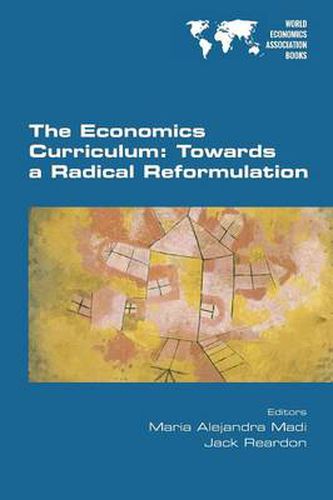Readings Newsletter
Become a Readings Member to make your shopping experience even easier.
Sign in or sign up for free!
You’re not far away from qualifying for FREE standard shipping within Australia
You’ve qualified for FREE standard shipping within Australia
The cart is loading…






This title is printed to order. This book may have been self-published. If so, we cannot guarantee the quality of the content. In the main most books will have gone through the editing process however some may not. We therefore suggest that you be aware of this before ordering this book. If in doubt check either the author or publisher’s details as we are unable to accept any returns unless they are faulty. Please contact us if you have any questions.
This World Economics Association (WEA) volume - edited by Maria Alejandra Madi and Jack Reardon and supported throughout by Grazia Ietto-Gillies - originated with a successful WEA online conference (curriculumconference2013.worldeconomicsassociation.org). The volume has been conceived with current and future economics students in mind: they will be the economists of the future. One of the main ideas underlining the book is that being an economist in the XXI century requires a radical change in the training of economists and such change requires a global effort. A new economics curriculum is needed in order to improve the understanding of the deep interactions between economics and the political forces and the historical processes of social change. The need for trans-disciplinary and interdisciplinary work is highlighted. Discussions include the following. Main critiques of current practices on theory, methods and structures. Current gaps in the economics curriculum. What should economics graduates know? The contributors are: Nicola Acocella, Sheila Dow, David Hemenway, Arturo Hermann, Grazia Ietto-Gillies, Maria Alejandra Madi, Lars P&aaring;lsson Syll, Constantine Passaris, Paul Ormerod, Jack Reardon, Alessando Roncaglia, Asad Zaman. We hope the volume will stimulate further debate by both students and professional economists - whether academics or not - on how to progress towards an economics curriculum fit for the XXI century.
$9.00 standard shipping within Australia
FREE standard shipping within Australia for orders over $100.00
Express & International shipping calculated at checkout
This title is printed to order. This book may have been self-published. If so, we cannot guarantee the quality of the content. In the main most books will have gone through the editing process however some may not. We therefore suggest that you be aware of this before ordering this book. If in doubt check either the author or publisher’s details as we are unable to accept any returns unless they are faulty. Please contact us if you have any questions.
This World Economics Association (WEA) volume - edited by Maria Alejandra Madi and Jack Reardon and supported throughout by Grazia Ietto-Gillies - originated with a successful WEA online conference (curriculumconference2013.worldeconomicsassociation.org). The volume has been conceived with current and future economics students in mind: they will be the economists of the future. One of the main ideas underlining the book is that being an economist in the XXI century requires a radical change in the training of economists and such change requires a global effort. A new economics curriculum is needed in order to improve the understanding of the deep interactions between economics and the political forces and the historical processes of social change. The need for trans-disciplinary and interdisciplinary work is highlighted. Discussions include the following. Main critiques of current practices on theory, methods and structures. Current gaps in the economics curriculum. What should economics graduates know? The contributors are: Nicola Acocella, Sheila Dow, David Hemenway, Arturo Hermann, Grazia Ietto-Gillies, Maria Alejandra Madi, Lars P&aaring;lsson Syll, Constantine Passaris, Paul Ormerod, Jack Reardon, Alessando Roncaglia, Asad Zaman. We hope the volume will stimulate further debate by both students and professional economists - whether academics or not - on how to progress towards an economics curriculum fit for the XXI century.